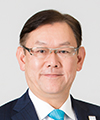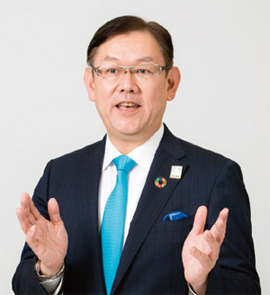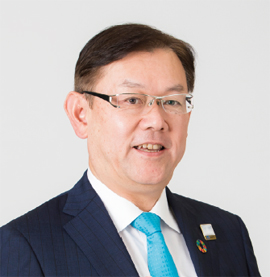 |
|||||
|
|
|||||
|
View from the Top Vol. 18, No. 6, pp. 1–5, June 2020. https://doi.org/10.53829/ntr202006tp1
Turning Crisis into Opportunity for Transformation: Understand the World and Discover Unknown ValueOverviewNTT is promoting the Innovative Optical and Wireless Network (IOWN) to provide an information and communication technology infrastructure that brings about various benefits. The company is pursuing research and development of key technologies to implement IOWN in 2030. Now that the entire world has been hit by an unprecedented situation due to the coronavirus (COVID-19) pandemic, expectations for NTT’s efforts based on its philosophy of contributing to society are growing. We talked with Katsuhiko Kawazoe, NTT Senior Vice President, Head of Research and Development Planning Department, about the attitude of his department—which ought to be called the “brain of NTT”—to tackle this crisis and the sense of value of NTT researchers. Keywords: IOWN, social contribution, teleworking No matter what happens, we must not use this crisis as an excuse for stagnant growth—It has been more than two years since you were appointed head of Research and Developing Planning Department. How has the coronavirus (COVID-19) pandemic affected your initial plans? I have been working for more than two years to strengthen our research laboratories and expand them globally. I think that we reached a major milestone when we announced the concept of the Innovative Optical and Wireless Network (IOWN) for continuous technological innovation. However, I never imagined that the whole world would be transformed in such a short term due to the coronavirus pandemic. In the midst of this whirlpool, people’s values have changed drastically. Looking ahead to a society that has changed compared to before the pandemic, we are thinking about whether what we have planned should be changed and what we should prioritize. At NTT, we are trying to ensure we do not use the effects of the coronavirus pandemic as an excuse, however, the global situation has changed completely in different ways such as economic stagnation and people participating in social activities at home. Under the current circumstances, we must consider the best contribution we can make to creating a new society in which people live happily. Depending on the theme, some research and development (R&D) might proceed toward its goal without influence from its surroundings, but since many research themes are for the sake of humanity, they are always influenced by the world in which we live. After the 2011 Great East Japan Earthquake, we keenly sensed the powerlessness of humanity; however, the coronavirus pandemic has reminded us that humanity bears unknown risks. As you know, information and communication technology (ICT) is now an indispensable foundation of all industries; even so, current ICT is not always at its ultimate performance. The ability of ICT must be further improved so that it can confront unknown risks, including those in the medical field. I am currently asking all researchers at our laboratories to think what their research themes should be under the present situation and whether they should be changed. Now that society’s values have changed, society is demanding change; accordingly, I want our researchers to think of the present situation as a time to reconsider the value of their research themes. As one example of such changing values, in Japan, it has been said that we should reduce close contact with people by 80%. The important point is whether this effort can be proved to be effective and evaluated as a numerical value. NTT DOCOMO’s Mobile Spatial Statistics provides population dynamic statistics by region. Through this service, we can see daily changes in population surrounding major stations and other locations, and the service has been received positive feedback. However, it is preferable to provide not only statistical values but also information on the state of each population flow and the degree of closeness of people to one another. As a useful technology for navigation, NTT laboratories have developed a cloud-based GNSS (global navigation satellite system) that improves the accuracy of satellite-positioning systems by using cloud processing. Using this technology makes it possible to reduce positioning error, which used to be several meters, to the level of several dozen centimeters, which makes it possible to monitor the contact distance between people. Therefore, it is necessary to determine whether our technology can be extended to provide what society currently requires. However, such a reactive approach is not enough. As I mentioned earlier, the “after corona” era will bring new values. We must proactively consider how to grasp, understand, and respond to these values.
—You are promoting social contribution unique to NTT. Your mission is to carry on with your business under these difficult circumstances. What is your outlook? We will surely see some fields in which we cannot succeed in the way we usually do business. An example of such a field is a business model involving understanding customer issues while engaging with them, and visiting customer premises to improve customer business or making new proposals. These activities will be reduced because it is difficult to create opportunities even during normal times. In contrast, the field of teleworking—which we are currently engaged in for this interview—is required by many people. However, a major issue is the rapid increase in traffic due to the sudden need for teleworking following the government’s state-of-emergency declaration and stay-at-home request in Japan. Although the backbone network has sufficient capacity to withstand this need, it is sometimes the case that the quality of video and audio during important meetings temporarily deteriorates owing to processing limitations on servers. Under these circumstances, I believe that new business areas will be revealed to guarantee the quality of information communication infrastructure including video-distribution servers. In consideration of the pursuit of both convenience and economy, the most-important tool is the Internet, and the Internet of Things is a prerequisite for new fields. I also assume that many people have realized that the quality of the Internet is not uniform in this current situation. I strongly feel the need to tackle this issue as a business. I do not necessarily mean that NTT should make a profit; instead, I think the attitude of promoting social contribution is important. The need for IOWN has accelerated—In this social situation, how will the medium-term management strategy be implemented? In particular, tell us about NTT’s initiative concerning IOWN and response to the sports events that have been postponed. In May 2019, we proposed the concept of IOWN [1] for envisioning what society should be toward 2030 and promoting technological development within NTT to create that society. In April 2020, we announced a concrete roadmap [2]; however, society has rapidly changed since then, and technology that responds to this rapid change is being increasingly demanded. To meet that demand, the trend to develop technology for IOWN is accelerating. Recently, I have often been saying, “Let’s aim for disruptive innovation.” Since current technological development involves pursuing further upgrading of existing ICT, it has its limits. It is limited because the technology on which it is based—that is, an extension of conventional technology—is limited. Researchers have little courage to step up and change the base technology. In other words, they are conducting R&D only on the themes that are based on conventional technology. According to the concept of IOWN, in contrast, researchers are encouraged to disrupt conventional technology. We plan to promote many research themes that have been created to actualize IOWN. Similarly, major changes will be required in response to the sports events that have been postponed. The needs of the audience and the feelings and expectations of society concerning these events will change significantly. If we consider our ultra-realistic communication technology called Kirari!, which enables you to experience the sense of being at a competition venue from a remote place in real time, the original premise of conveying that sense of presence will be broken unless the audience gathers at the venue. The key to suppressing the spread of the coronavirus is to disperse a group of people instead of having them gather. Accordingly, by developing technology to enable people to enjoy an event even if they are separated, we should be able to create new technology and value. It would be ideal if many international spectators will come to visit Japan next year; unfortunately, fear of the coronavirus may make people reluctant to visit. However, even under these circumstances, we must strive for success, and I think we must not misunderstand what we call “success.” If we approach this event with conventional viewpoints, we may miss an opportunity for success.
—I understand that it is time to change our values in business. Do you have experience in transforming your values? Yes, I do. Many events in my life have had a great impact on my values. For example, when I was a young child, I went with my parents to live in New York. There, I suddenly found myself at a school—surrounded by people who were non-Japanese—with a completely different culture to the one I knew. Looking back, I realize now that I was able to experience different cultures in a completely unknown world, learn about diversity, change my values, and learn ways to survive. Although that childhood experience caused the most significant change in my values, the most recent one is the present coronavirus pandemic. In this crisis, our top management encouraged us to find various possibilities for the company and employees. I feel that this crisis presents a great opportunity for our laboratories. However, we need a considerable amount of readiness in mind. To take advantage of this opportunity, we need to be prepared to throw away everything we have. Starting something new involves a lot of risk, so we are experiencing a major transformation during which we must proceed with determination to face that risk. People may be happy with the status quo, they may not like to take risks, or they may fear risk and avoid it. I think we can keep up with new transformations by turning risks into opportunities without fear. If you draw the future, the past will be rewritten—What is crucial when making an important decision? If you climbed to the eighth station (of the ten) of Mt. Fuji, but you foresee a serious risk ahead, you will have to make a very difficult decision: either discard the hard work up to the eighth station or face the risk and carry on. When faced with such a situation, we would look back to learn from the past and think of ways to avoid risks wherever possible. However, I think we have entered an era in which such thinking alone does not work. Thinking chronologically, namely, about the past, present, and future (in that order) has limitations: new incidents are dealt with each time they occur and are connected in a piecemeal fashion, so situations in which the future cannot be fully predicted will continue. In the metaphor of climbing Mt. Fuji, being at the eighth station, you are in a situation in which you cannot make the best decision. This is converted from a chronological way of thinking into a non-chronological way of thinking, namely, considering the future, present, and past (in that order). In other words, we imagine the future, think about the present, and sometimes change our interpretation of the past. Perhaps some people imagine that it would be unfortunate to give up climbing the mountain and descend from the eighth station, which they struggled to reach. However, they might have been happy because they descended the mountain. Thinking non-chronologically can change our value judgments made in the past. I think this kind of thinking may bring happiness to people. People tend to think of happiness as something instantaneous; in reality, however, I think that happiness is accumulated from the past into the future and that it is important to accumulate the moments of feeling happiness. I also think we should provide our research and technology to foster happiness. —What do you think is required of the Research and Development Planning Department? The R&D activity that I am in charge of does not make profit directly; in fact, it leads to costs. However, it is also true that R&D activities can cultivate the next growth engine for a company. Business activities are always focused on cost-effectiveness and efficiency. For example, Google is spending trillions of dollars to develop artificial intelligence, but cost efficiency and cost effectiveness are required in that development. In the same way, even though the NTT Group has different business domains for each company and department, it is necessary for the Group as a whole to consider cost-effectiveness, reduce waste, and efficiently engage in corporate activities. In that sense, I think that the Research and Development Planning Department is one of the departments that thinks about efficiency most and bears the expectations concerning the future of technology that has been researched and developed with high cost. I feel a great responsibility for allowing us to continue R&D activities despite the fact that the NTT Group is facing a difficult situation in terms of profitability due to the coronavirus pandemic. When I look at society as a whole, I wonder if the current research themes should be pursued. I think it is necessary for researchers to recognize this social situation fully and to seriously carry out their research in light of the values of the NTT Group as a whole. I am convinced that if we fully understand this situation and implement our R&D accordingly, we can contribute to society through our operating companies. I think all our researchers should take this opportunity to remember why they became researchers in the first place and return to their starting point. In a sense, researchers are a “special” profession. I guess that when you first started your career as a researcher, you must have determined to contribute to society after receiving research funding. I want you to go back there. If there are people nearby who are only thinking about making money, you may be tempted. However, if you are true researchers, your determination and aspirations in your early days should not be altered. If close contact between people must be reduced by 80%, increase online contact by 80%!—You look at the positive side in everything. Tell us the positive aspects you found through teleworking. I think that there are things we can do because we are being asked to refrain from going outside. As I said in a previous interview, one of my hobbies is cooking. I enjoy going to my favorite market and purchasing fresh fish to cook; however, I cannot go out freely now, so I am trying to devise recipes under limited conditions. I am enjoying using my imagination because I can use my time more efficiently than ever before. Many people are worrying about how long this situation will last and that most things will end up being done at home. As I feel with my cooking, people might be feeling their limit in doing things and may get stuck. In such a case, it is important to think positively about the situation in a manner like how to find the next challenge. Therefore, I thought that if we have to reduce close contact between people by 80%, let’s increase online contact by 80%! At a time like this, I think we can take the opportunity to meet online people that we have not been able to meet easily. By finding many people we want to meet and meeting more and more of them online, we can exchange information and deepen our connections. In the past, it was sometimes necessary to meet people face-to-face, but that constrain has now been removed. There is no way we cannot take advantage of this opportunity. I think that possibilities will multiply if we change our perspective slightly in the way I described above. References
Interviewee profileCareer highlightsKatsuhiko Kawazoe joined NTT in 1987. He became vice president of Research and Development Planning Department in 2008, head of NTT Service Evolution Laboratories in 2014, and head of NTT Service Innovation Laboratory Group in 2016. He became senior vice president, head of Research and Development Planning Department in June 2018. He has also served as director of NTT Research, Inc. since April 2019 and president and chairperson of IOWN Global Forum since January 2020. He received a Ph.D. in engineering. |
|||||



